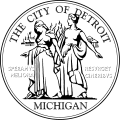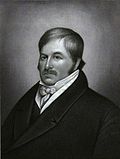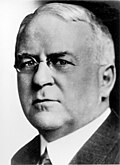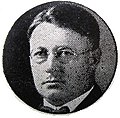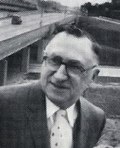| # |
Mayor |
Term |
Party |
Notes |
|---|
| 1 |
 |
John R. Williams |
1824–1825 |
Democratic[10] |
John R. Williams wrote the City Charter and served from 1824 to 1825 as the first mayor under the re-incorporation.[7] He also served a second time in 1830, and a third in 1844–1846. He was a successful merchant, and served in a number of other capacities, including as one of the first trustees of the University of Michigan, was president of the Detroit Board of Education, and was a delegate to the first Michigan Constitutional Convention.[11] |
| 2 |
 |
Henry Jackson Hunt |
1826 |
Democratic[10] |
Henry Jackson Hunt was a successful merchant, and served in various political offices, including county judge, city assessor, and trustee of the University of Michigan.[7] He was the uncle and namesake of Civil War General Henry Jackson Hunt. Hunt died while in office on September 15, 1826.[9] |
| 3 |
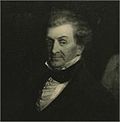 |
Jonathan Kearsley |
1826 |
Democratic[12] |
Jonathan Kearsley served in the War of 1812, and was wounded badly enough to have his leg amputated.[13] He moved to Detroit in 1819 to become of Receiver of Public Monies, a post he held for 30 years. Kearsley was mayor twice, being appointed once in 1826 to fill Henry Jackson Hunt's term after his death, and being elected himself in 1829.[7][9] |
| 4 |
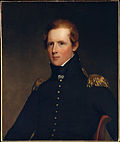 |
John Biddle |
1827–1828 |
Whig[14] |
Major John Biddle was born in Philadelphia, Pennsylvania in 1792, the son of Charles Biddle, former Vice President of Pennsylvania,[15] He was in the US Army during the War of 1812, and was active in Detroit politics and civic life. He went on to serve as Michigan Territory delegate to the United States House of Representatives. His summer estate, "Wyandotte," was expanded into the current city of Wyandotte, Michigan.[15] |
| 5 |
 |
Jonathan Kearsley |
1829 |
Democratic[10] |
(see above) |
| 6 |
 |
John R. Williams |
1830 |
Democratic[10] |
(see above) |
| 7 |
 |
Marshall Chapin |
1831 |
Whig[10] |
Marshall Chapin trained as a medical doctor, and established the first drugstore in Detroit in 1819,[13] which endured well after Chapin's death and on into the 1880s.[7] He served twice as mayor (in 1831 and 1833) and was appointed City Physician during the cholera epidemics of 1832 and 1834.[13] |
| 8 |
 |
Levi Cook |
1832 |
Whig[16] |
Levi Cook served in multiple positions in the government of Detroit and Michigan, including as Representative to the State House, Treasurer of the Michigan Territory, and mayor of Detroit in 1832, 1835, and 1836.[13] |
| 9 |
 |
Marshall Chapin |
1833[13] |
Whig[10] |
(see above) |
| 10 |
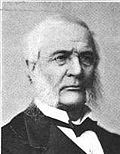 |
Charles Christopher Trowbridge |
1834 |
Whig[17] |
Trowbridge moved to Detroit in 1819, at 19 years of age. In 1820, he served on the Lewis Cass expedition, led by Lewis Cass, so impressing Cass that the latter made Trowbridge his private secretary.[18] In 1821, Trowbridge helped negotiate a treaty between the US government and the Winnebago and Menominee Indians, and was later appointed assistant secretary in the local Indian department.[18] In 1833, Trowbridge became an alderman of the city of Detroit,[18] and briefly served as Mayor during the cholera epidemic of 1834, resigning his position soon after.[19] In 1837, he ran as the Whig candidate for governor of Michigan, and was defeated by Stevens T. Mason. |
| 11 |
 |
Andrew Mack |
1834 |
Democratic[20] |
A cholera epidemic broke out in 1834 during Mayor Charles Christopher Trowbridge's term; when the epidemic had subsided, Trowbridge resigned.[13] Andrew Mack won the ensuing special election on September 24 with 91 votes.[21] He later represented Wayne County in the Michigan Legislature.[13] |
| 12 |
 |
Levi Cook |
1835–1836 |
Whig[10] |
(see above) |
| 13 |
 |
Henry Howard |
1837 |
Democratic[22] |
Henry Howard moved to Detroit in 1827 to manage Howard and Wadhams, a commercial lumber venture. In his brief tenure in Detroit, he served as an alderman and mayor for one term, as well as the treasurer and auditor general of the state of Michigan. In 1840, Howard moved to Buffalo, New York to become treasurer of the Buffalo Savings Bank.[22] |
| 14 |
 |
Augustus Seymour Porter |
1838 – March 14, 1839 |
Whig[23] |
Augustus Porter was the nephew of Peter Buell Porter; he practiced law for 20 years in Detroit, acting as city Recorder in 1830 and elected mayor in 1838.[24] He resigned on March 14, 1839, to serve as United States Senator for Michigan.[9] In 1846 he moved to Niagara Falls, New York.[24] |
| 15 |
 |
Asher B. Bates |
March 15, 1839 – April 18, 1839[25][26] |
Whig |
Asher Bates came to Detroit in 1831, and served as Justice of the Peace and City Attorney.[13] After Porter resigned, Bates was acting mayor for the remainder of Porter's term.[9] He later served as Attorney General for the Kingdom of Hawaii[13] and died in 1873 in San Francisco of leprosy contracted in Hawaii.[27] |
| 16 |
 |
De Garmo Jones |
1839 |
Whig[28] |
De Garmo Jones came to Detroit from Albany, New York, and was involved in many business ventures, including the Michigan Central Railroad.[13] In addition to serving as mayor, he was a city alderman multiple times, as well as state senator.[13] |
| 17 |
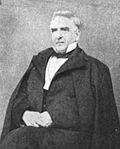 |
Zina Pitcher |
1840–1841 |
Whig[29] |
Zina Pitcher was a medical doctor, and began his career as a surgeon in the United States Army, eventually becoming president of the Army Medical Board in 1835.[13] After leaving the Army, he came to Detroit in 1836 and served in various positions, including both city and county physician, Regent of the University of Michigan, and three terms as mayor (1840, 1841, and 1843).[13] While Regent, Pitcher took an active role in establishing the medical school at the university.[13] |
| 18 |
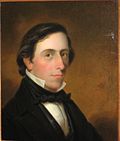 |
Douglass Houghton |
1842 |
Democratic[10] |
Douglass Houghton was educated as a medical doctor, but after coming to Michigan served as the state geologist from 1833 until his death in 1845, and as a geology professor at the University of Michigan.[13] He was also a member of the National Institute in Washington DC and the Boston Society of Natural History, an honorary member of the Royal Antiquarian Society of Copenhagen, and a member of many other scientific and literary associations.[13] Houghton died in 1845 in a storm on Lake Superior near Eagle River, Michigan.[13] Houghton County, Michigan is named in his honor.[13] |
| 19 |
 |
Zina Pitcher |
1843 |
Whig[29] |
(see above) |
| 20 |
 |
John R. Williams |
1844–1846 |
Democratic[10] |
(see above) |
| 21 |
 |
James A. Van Dyke |
1847 |
Whig[30] |
James A. Van Dyke was a lawyer by profession, served as City Attorney for Detroit, Wayne County prosecuting attorney, city alderman, and mayor.[13] In addition, he was heavily influential in early organization of the Detroit Fire Department, serving as president of the department from 1847 to 1851.[30] |
| 22 |
 |
Frederick Buhl |
1848 |
Whig[10] |
Frederick Buhl moved to Detroit in 1833 and, with his brother Christian H. Buhl, began a business in hats and furs.[13] The business was large and successful, and Frederick Buhl remained at the helm until 1887, when he sold the business to his son. In addition to his furrier business, Frederick Buhl was the director of two banks, the president of Harper Hospital, and one of the original directors of the Merchant's Exchange and Board of Trade.[13] He also served on the city council as well as being mayor, and later in life joined the Republican Party.[31] |
| 23 |
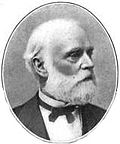 |
Charles Howard |
1849 |
Whig[10] |
Charles Howard moved to Detroit in 1840 as an agent for the shipping and forwarding firm of Bronson, Crocker, and Company, and branched out into railroad construction and other endeavors.[13] He was simultaneously president of the Farmer's and Mechanics Bank and the Peninsular Bank,[32] and in 1848 he was elected mayor of Detroit.[13] Howard moved to New York City after the Panic of 1857 caused the Peninsular Bank to fail.[33] |
| 24 |
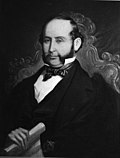 |
John Ladue |
1850 |
Democratic[34] |
In 1847, Ladue moved to Detroit, and began in the business of manufacturing leather and purchasing wool.[13] He was popular among the business community, and in 1850 was elected mayor.[13] He died only a few years after in 1854. |
| 25 |
 |
Zachariah Chandler |
1851 |
Whig[35] |
Zachariah Chandler arrived in Detroit in 1833 and opened a dry goods store.[13] After serving as mayor of Detroit, Chandler spent 18 years in the United States Senate, and was also the United States Secretary of the Interior under Ulysses S. Grant. |
| 26 |
 |
John H. Harmon |
1852–1853 |
Democratic[13] |
John Harmon came to Detroit in 1838, as a member of the Hunter Patriots, a group dedicated to ridding North America of the British Empire.[36] In December 1838, Harmon took part in the Battle of Windsor, personally burning the British barracks and the steamer Thames.[36] After the battle, Harmon stayed in Detroit, taking a job at the Detroit Free Press, and eventually purchasing the paper.[13] Harmon served as an alderman of the city of Detroit in 1847 and two years as mayor,[13] as well as representing Michigan on the 1848 Democratic National Committee,[37] and serving as Collector for the Port of Detroit. After he left the office of Collector, Harmon spent much of his time in Washington, DC, during congressional sessions.[38] |
| 27 |
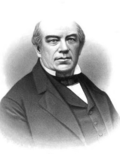 |
Oliver Moulton Hyde |
1854 |
Whig[13] |
Oliver Moulton Hyde moved to Detroit in 1838 and opened a hardware store on Woodward Avenue.[13] Hyde branched out in business, opening a foundry and machine shop, and began manufacturing marine engines and other steamboat hardware, and later began a dry dock business.[13] Hyde was elected to the city council numerous times, and served as mayor of Detroit in 1854, 1856, and 1857. He was also appointed Collector for the Port of Detroit under presidents Zachary Taylor and Millard Fillmore.[13] |
| 28 |
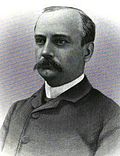 |
Henry Ledyard |
1855 |
Democratic[39] |
Henry Ledyard was the son of prominent New York lawyer Benjamin Ledyard and Susan French Livingston (the daughter of Revolutionary War Colonel and US Supreme Court justice Brockholst Livingston and granddaughter of New Jersey governor William Livingston).[13] When Lewis Cass was appointed Minister to France, Ledyard accompanied him to Paris, eventually becoming chargé d’affaires of the embassy and marrying Cass's daughter Mildred.[13] Ledyard returned to the United States in 1844 and moved to Detroit, serving as a member of the Board of Education, an alderman of the city, one of the original commissioners on the Board of Water Commissioners, mayor in 1855, and state senator in 1857.[13] When Lewis Cass was appointed Secretary of State under James Buchanan, Ledyard accompanied him to Washington, DC, and remained there until 1861,[13] briefly serving as assistant secretary of state.[39] Afterwards, he moved to Newport, Rhode Island, where he lived for the rest of his life and was the first president of the Newport Hospital and the president of the Redwood Library.[13] |
| 29 |
 |
Oliver Moulton Hyde |
1856–1857 |
Whig |
(see above) |
| 30 |
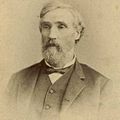 |
John Patton |
1858–1859 |
Democratic[40] |
John Patton was a carriagemaker born in County Down, Ireland. He emigrated to the United States as a boy, and later came to Detroit and established a factory.[40] He held many positions in the city, including chief engineer of the Fire Department, the Department president, city alderman, mayor, county auditor, Wayne County, Michigan sheriff, Justice of the Peace, and United States consul at Amherstburg, Ontario.[40] |
| 31 |
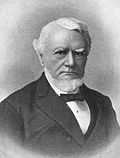 |
Christian H. Buhl |
1860–1861 |
Republican[41] |
Christian H. Buhl moved to Detroit in 1833 and, with his brother Frederick Buhl, began a business in hats and furs.[13] The business was large and successful, and in 1855, Christian retired from the fur trade and started a wholesale hardware firm. Buhl was also part owner of the Sharon Iron Works, the Detroit Locomotive Works (later the Buhl Iron Works),[13] and organized Detroit Copper and Brass Company and the Peninsular Car Company.[41] He was an alderman as well as mayor of Detroit. |
| 32 |
 |
William C. Duncan |
1862–1863 |
Democratic[42] |
William C. Duncan moved to Detroit in 1849 and set up shop as a brewer.[13] He quickly became popular, and in 1852 was elected city alderman. He also served as the first council president,[42] mayor, and state senator.[13] Ill-health in the mid-1860s forced his retirement from business and politics, and Duncan died, childless, in 1877.[13] |
| 33 |
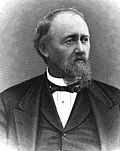 |
Kirkland C. Barker |
1864–1865 |
Democratic[10] |
Barker was born in Schuyler, New York, and worked in the shipping business before coming to Detroit and establishing the successful tobacco business of KC Barker & Company.[13] An avid outdoorsman, Barker was also the presiding officer of the Horse Association of America, and was elected Commodore of the Great Lakes Yacht Club.[43] He died in a boating accident near his home on Grosse Ile, Michigan.[13] |
| 34 |
 |
Merrill I. Mills |
1866–1867 |
Democratic[13] |
Mills, born in Canton, Connecticut, originally planned to start a general store in Fort Wayne, Indiana in 1845. However, early closing of navigation that year left Mills with his stock in Detroit, and, sensing an opportunity, he set up shop there instead.[13] Barker soon began trading in furs, then went into tobacco manufacturing as well as other pursuits.[13] In addition to being mayor, he served two years as head of the Democratic State Committee, and was a delegate to the 1876 Democratic National Convention.[13] |
| 35 |
 |
William W. Wheaton |
1868–1871 |
Democratic[13] |
Wheaton was born in New Haven, Connecticut in 1833.[13] He came to Detroit in 1853 and built a successful wholesale grocery business.[13] He was elected mayor in 1868, and later served as the chair of the Democratic State Convention.[13] |
| 36 |
 |
Hugh Moffat |
1872–1875 |
Republican[13] |
Moffat was born in 1810 in Coldstream, Scotland, and made his way to Detroit in 1837.[13] He began work as a carpenter, built up a successful and profitable business and expanded into the lumber trade by purchasing a sawmill and forested land.[13] Moffat was elected mayor for two terms; his administration was marked by a fractious relationship with the Detroit City Council, but his integrity earned him the moniker "Honest Hugh Moffat."[13] |
| 37 |
 |
Alexander Lewis |
1876–1877 |
Democratic[13] |
Alexander Lewis was born in Windsor, Ontario and came to Detroit when he was 14 to work as a clerk.[13] He eventually started his own forwarding & commission business, then moved onto wholesale trade and other businesses. In addition to being mayor, he served as Police Commissioner and a board member of the Detroit Public Library.[13] |
| 38 |
 |
George C. Langdon |
1878–1879 |
Democratic[44] |
George C. Langdon began work as a clerk, and eventually went into the business of brewing and malting, amassing a considerable fortune.[45] After his stint in the mayor's office, he suffered some reversals of fortune, and was forced to return to clerking at the City Hall.[45] |
| 39 |
 |
William G. Thompson |
1880–1883 |
Republican[46] |
Thompson was a Republican while serving as mayor, and a delegate to both the 1876 and 1880 Republican National Convention.[46] However, in 1884 he switched parties to become a Democrat. He ran once more for mayor in 1891, being defeated by the then-incumbent Hazen S. Pingree.[47] He also served as a state senator, being elected in 1894.[48][49] In 1888, Thompson was party to a sensational and public fight, where Thompson was considerably pummeled, with his broth-in-law Daniel Campau, where the latter warned Thompson that "he must not talk about his wife hereafter in barrooms and other public places, as he had been doing."[50] William G. Thompson died in 1904 of injuries received after being knocked down by a bicycle.[48] |
| 40 |
 |
Stephen Benedict Grummond |
1884–1885 |
Republican[13] |
Stephen Benedict Grummond was born in Marine City, Michigan, and made his fortune in the shipping and marine industry.[13] Grummond was originally a Democrat, but joined the Republican Party when it was established, and served on the Board of Estimates, the Detroit City Council, and one term as mayor.[13] |
| 41 |
 |
Marvin H. Chamberlain |
1886–1887 |
Democratic[13] |
Marvin H. Chamberlain was a wholesale liquor distributor.[51] He served as president of the Detroit City Council before being elected mayor.[13] In 1898, Chamberlain patented a "liquid separating process" for reduction of garbage, and received the contract to collect garbage in Detroit under the company name of Detroit Liquid Separating Co.[52] He later built similar plants in other cities.[51] |
| 42 |
 |
John Pridgeon Jr. |
1888–1889 |
Democratic[10] |
John Pridgeon Jr. was born in Detroit on August 1, 1852, the son of Captain John Pridgeon.[13] In 1871, he joined as a clerk his father's business of buying, selling, and operating sailing ships and tugs.[13] Pridgeon was a member of the first Park Commission, serving from 1879 to 1883.[53] He was elected to the city council in 1885, and in 1887 was elected mayor of Detroit, serving one term in 1888–1889.[13] He later served as a member of the Police Commission from 1891 to 1892.[53] After his stint as mayor, Pridgeon diversified his business interests, and in the years 1890–1900 served variously as president of the State Transportation Company, president of the Pridgeon Transportation Company, vice-president of the White Star Line, vice-president of the Red Star Line, and vice-president of the River Savings Bank.[53] |
| 43 |
 |
Hazen S. Pingree |
1890–1897 |
Republican[10] |
Hazen Pingree was born in Denmark, Maine, and worked for several years in a shoe factory before enlisting in the Union Army to serve in the Civil War.[54] Following the war, Pingree moved to Detroit and there established the Pingree and Smith Shoe Co., which eventually had sales of over $1,000,000 per year.[55] Pingree was elected mayor of Detroit in 1889 on a platform of exposing and ending corruption in city paving contracts, sewer contracts, and the school board.[55] During the depression of 1893, Pingree expanded the public welfare programs, initiated public works for the unemployed, built new schools, parks, and public baths.[55] He gained national recognition through his "potato patch plan," a systematic use of vacant city land for gardens which would produce food for the city's poor.[55] Pingree was elected mayor four times, and in 1896 was elected Governor of Michigan.[54] However, his right to hold the two offices simultaneously was contested, and after the Michigan Supreme Court ruled against him, Pingree resigned as mayor on March 22, 1897.[9][55] During his four years in office, the direct election of U.S. senators was promoted; an eight-hour workday was endorsed; a regulated income tax was supported; and railroad taxation was advocated.[56] |
| 44 |
 |
William Richert |
March 22, 1897 – April 5, 1897 |
Republican[57] |
William Richert served on the Detroit City Council for eight years, and as president of the body in 1895 and 1897.[58] Richert served as acting mayor from March 22 to April 5, 1897, after Pingree was declared ineligible to serve as both mayor and governor.[9] |
| 45 |
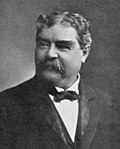 |
William C. Maybury |
1897–1904 |
Democratic[10] |
Maybury served as the city attorney for Detroit during the 1870s, and was twice elected to the United States House of Representatives, in 1882 and 1884.[59] He was elected mayor of Detroit in 1897 to complete Hazen S. Pingree's term, and was elected twice thereafter. In 1900, Maybury ran unsuccessfully for Governor of Michigan.[59] |
| 46 |
 |
George P. Codd |
1905–1906 |
Republican[10] |
George P. Codd studied as a lawyer and was admitted to the bar in 1892.[60] He was assistant city attorney from 1894 to 1897, a member of the board of aldermen from 1902 to 1904, mayor of Detroit from 1905 to 1906, a regent of the University of Michigan in 1910 and 1911, circuit judge of Wayne County from 1911 to 1921 and 1924 to 1927, and a member of the United States House of Representatives from 1921 to 1923.[60] |
| 47 |
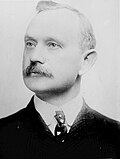 |
William Barlum Thompson |
1907–1908 |
Democratic[10] |
William Barlum Thompson served as an alderman for two terms, from 1891 to 1894, and was elected for a third term in 1896.[61] He resigned his seat as an alderman in 1897 after being elected city treasurer, and served as mayor for two terms, in 1907–1908 and 1911–1912.[61] |
| 48 |
 |
Philip Breitmeyer |
1909–1910 |
Republican[10] |
After finishing school, Breitmeyer joined the family florist business, John Breitmeyer & Sons, and after his father's death bought out his brothers to become sole owner of the firm.[62] The business grew rapidly, and Breitmeyer was one of the organizers, and served as president, of Florists' Telegraph Delivery (now Florists' Transworld Delivery, or FTD).[62] Breitmeyer was appointed by George P. Codd as Commissioner of Parks and Boulevards for the city of Detroit.[63] So well did he perform that he was nominated as the candidate for mayor, and was elected for a term in 1909–1910.[63] Breitmeyer ran again for mayor in 1933, but was soundly defeated by James Couzens's son Frank.[64] |
| 49 |
 |
William Barlum Thompson |
1911–1912 |
Democratic[10] |
(see above) |
| 50 |
 |
Oscar Marx |
1913–1918 |
Republican[10] |
Oscar Marx was born on July 14, 1866, in Wayne County, Michigan, the son of German immigrants.[65] As Detroit and Hamtramck, Michigan grew, the encroaching cities swallowed the Marx farm; when Oscar Marx's father sold the farm, he gave Oscar several thousand dollars, which he used to buy into a bankrupt optical firm, the Michigan Optical Company.[65] Marx steered the company to become one of the largest in the region.[65] In 1895 he was elected as an alderman, a position he held for eight years.[66] In 1910, he was appointed City Assessor, and two years later saw his first of three terms as Detroit's mayor.[65] Marx was friends with Robert Oakman and John Dodge, and the three men controlled the Republican Party in Southeast Michigan for much of the 1910s.[67] Marx appointed James J. Couzens, the man who would become the next mayor, to take over the Detroit police force,[67] |

